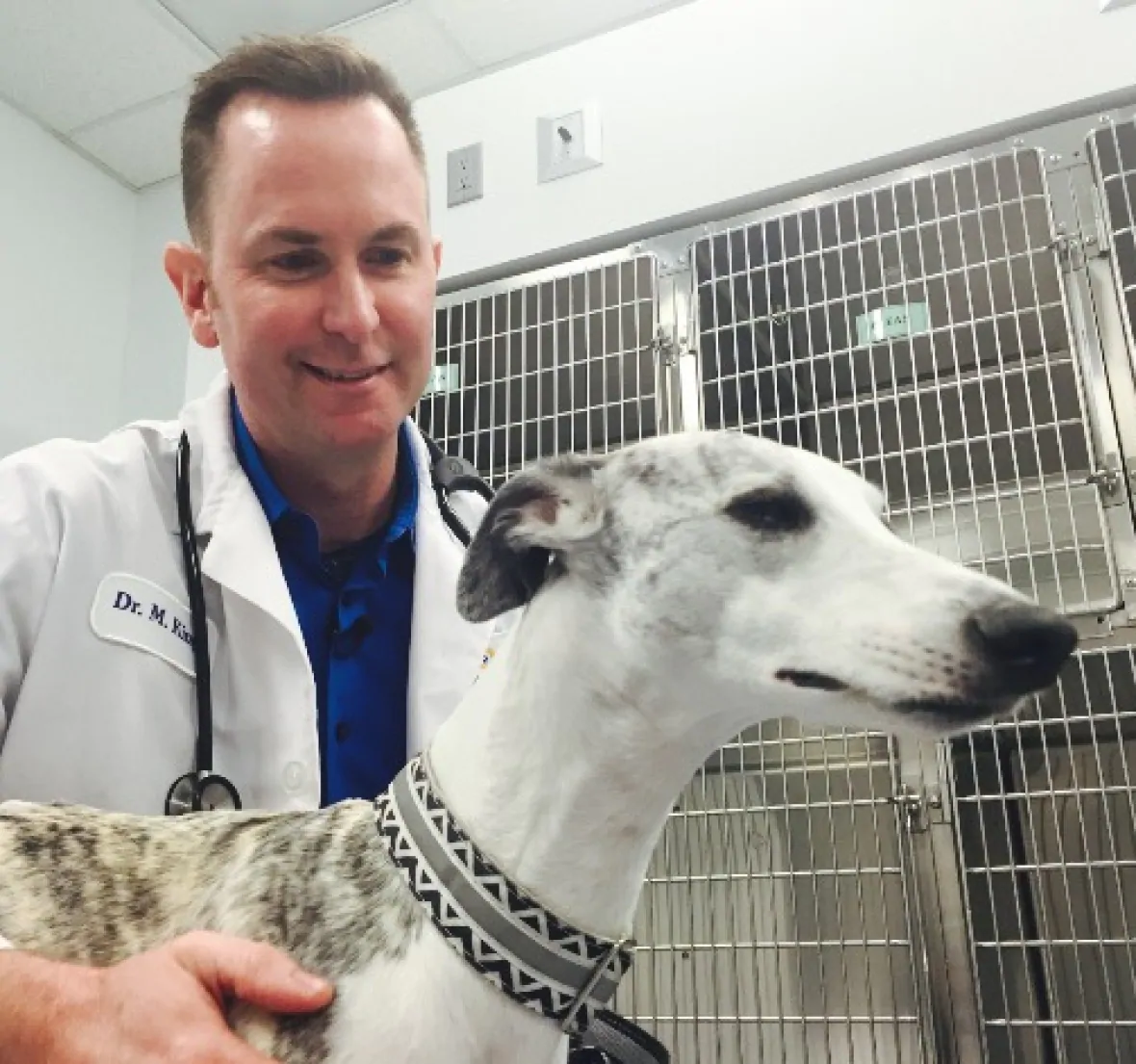Major pet insurer says dog injuries from 'jumping, running, slipping, tripping or playing' n

Lawyer says there's a 'dog can't be a dog' clause, but Petsecure pays out after Go Public investigates
Jamie Richardson's dog Muddy tore a ligament in his leg, but her pet insurance company denied the claim.
(Wayne Vallevand/CBC)
Jamie Richardson says she's "more than a little angry" the pet insurance company she's paid monthly for four years refused to cover her dog's injury.
"It just felt really shocking to know that this company was not there for me, when I needed them the most," says the Yukon woman.
Richardson's dog Muddy is a seven-year-old Akita breed.
While running in the woods near Whitehorse, Muddy tore a ligament in a hind leg.
A vet told Richardson that's a common injury in Yukon, where dogs can get their paws caught in a rabbit or fox hole, and twist their knees.

Jamie Richardson of Yukon says dealing with Petsecure turned into 'a horrible fiasco.' (Wayne Vallevand/CBC )
But when Richardson filed a claim to get reimbursed 80 per cent of her $4,200 vet costs, Canada's largest pet health insurance provider denied her claim.
Petsecure pointed to a clause in her policy denying coverage if a dog is injured while "jumping, running, slipping, tripping or playing."
"It takes away from him being a dog," says Richardson. "I think it defeats the principle of pet insurance."
After Go Public requested an interview, Petsecure reviewed the file and has now agreed to pay Richardson's claim.
In a letter sent to Richardson, the company says it decided to provide compensation because "Muddy has been a part of the PetSecure family for a long time."
'Crazy' fine print
Richardson says she saw a glossy brochure for Petsecure insurance at her vet's office four years ago.
She bought the basic "accident only" policy, because she was a student on a budget but still wanted some protection for her active dog.
"I just wanted something that, in the event that an emergency occurred, I was covered," she says.
A Vancouver lawyer who specializes in animal rights law says Richardson's policy has "one of the craziest clauses" she's ever come across.
"Basically, what that policy says is, the dog can't be a dog," Rebeka Breder says.

Breder says she gets a lot of complaints from pet owners about insurance policies not covering things they expected would be covered.
"Regardless of what that glossy brochure says ... always, always read the fine print," she advises.
"And not just the front page, or the first page, but the entire policy to make sure that what you think you're getting, is what you're actually getting."
Richardson says she did read the policy, but never thought the broad terms would lead to trouble.
Vancouver animal rights lawyer Rebeka Breder says
vague language in pet insurance policies can exclude claims. (CBC)
Pre-existing conditions
Petsecure pointed to another clause in Richardson's insurance policy, saying it would not cover an accident due to "arthritis and/or degenerative joint problems," and noted that Muddy's veterinary chart mentioned bone spurs.
The Whitehorse vet who made those notes told Richardson the bone spurs were normal for a seven-year-old dog, and minor.
Muddy had to be flown to Vancouver for surgery, and the vet who operated on the dog says an X-ray showed no sign of arthritis in the knee joint.

"The X-ray looked very, very clean," says Dr. Michael King, of Canada West Veterinary. "The injury is certainly not a result of arthritis. I'm disappointed the claim is being denied."
"This really enrages me," says Breder.
"Two vets say there was no pre-existing illness, yet the insurance company is claiming essentially that there was. It is just so obvious the insurance company doesn't want to pay out the claim. And that, to me, is wrong."
Dr. Michael King thinks Petsecure should have covered Muddy's
claim when the dog's owner first filed for compensation. (CBC)
Owner must witness accident
When Richardson called an insurance agent at Petsecure, she was told a new clause required her to have witnessed Muddy's accident.
"I feel this directly affects northerners and disregards our way of life," Richardson says.
"Open and rustic space is plentiful here — as are rabbit holes … elk, bears, wolves.… It's not always possible to maintain constant surveillance on your pet."
"The one moment I actually did need [pet insurance], it became this horrific fiasco — this very stressful fiasco."
- Jamie Richardson, dog owner
To Richardson, it all feels like Petsecure gave her the runaround.
"The one moment I actually did need it, it became this horrific fiasco — this very stressful fiasco, for me."
Only about two per cent of Canadians have pet health insurance, but that number is growing, says Breder, as people have fewer children.
"People are replacing human kids with pets," says the lawyer.
"They're becoming family members, and people want to do what they can to protect their family member."
In the U.K., heavy marketing has led to an estimated one in four pet owners paying for pet health insurance.
On its website, Winnipeg-based Petsecure boasts it has been in business for a quarter century, and recently served its one-millionth customer.
Pet insurance pros and cons
There are no statistics in Canada regarding how often pet insurance claims are paid out versus how often they get declined.
But veterinarian King says they're worth buying into, if the conditions are right.

Muddy's owner has now cancelled her policy with Petsecure, and will tuck away money for any future incidents. (Wayne Vallevand/CBC )
"The younger the pet — so if you have a puppy or kitten — it's worth getting a policy, because the argument about pre-existing injury or illness is that much smaller," he says. "And the payments are lower."
King also recommends comparing various plans to find out specifically what might be excluded based on the breed of dog or cat.
King says advancements in animal medicine also mean higher vet costs.
"It's very easy for serious life-threatening conditions to run into many thousands of dollars, very rapidly," says King. "I've seen animals' lives that have been saved only because they had pet insurance available."
But Breder takes a different approach.
Because of what she's seen with clients battling insurance companies, the lawyer suggests pet owners put the money they'd normally pay in insurance premiums into a separate bank account, to tap into if needed.
"The general figure recommended is $50 a month," says Breder, who says that's how much she puts away each month.
"You do have to be disciplined. But you know that you will have that money that you set aside. And you will be able to claim it, without a doubt."
Richardson wound up borrowing from friends and family to cover Muddy's vet costs.
She's now cancelled her policy with Petsecure, and will tuck away money for any future incidents.
Despite the experience, Richardson says she's still going to allow Muddy to "be a dog."
"But every time he runs into the woods, chasing a squirrel, I just think, oh, please, please ... be careful. Watch your step. Don't do it again!"
Written by: Erica Johnson - Investigative reporter












